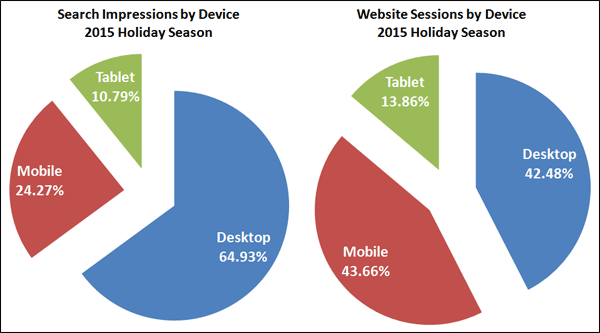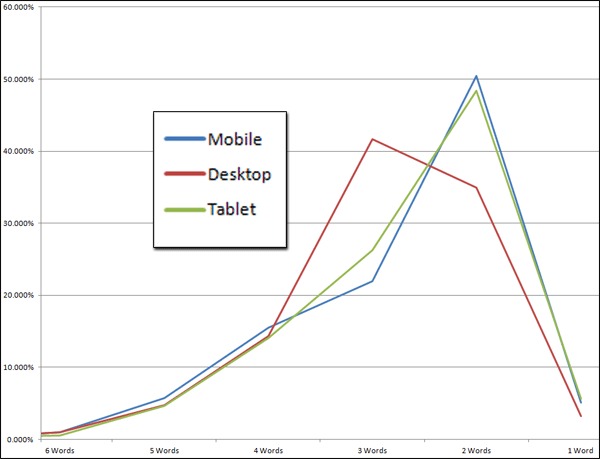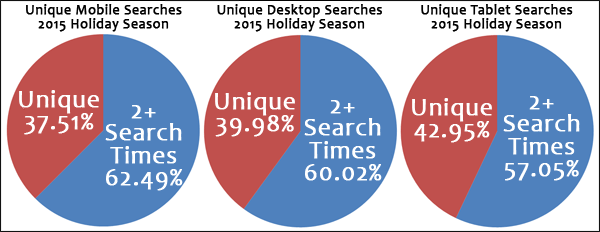
Throughout the past month, I analyzed different sets of keywords that I collected during the 2015 holiday season. Most of that research focused on overall analysis of the keyword data without breaking it down into the desktop, mobile, or tablet categories of devices. I chose that approach to save time, and quite frankly, so as not to bore everyone with too much similar information.
That said, in this edition, I am splitting apart the results to show you how the usage percentages were divided between the three different device types.
Search Impressions vs. Website Sessions
If you've been following closely then you'll remember that I clearly showed that desktop usage was less than 50% during the holiday season, but this pie chart seems to contradict that now:

It's very easy to get this data confused and think that it is contradicting itself, but the pie chart on the left shows all of the organic keyword data that I collected, which is always much higher than the eventual number of people who visit a website. My data shows that 64.93% of the keywords collected originated from desktop users and only 24.27% originated from mobile users. However, that 24.27% chunk of the pie grew to account for 43.66% of website sessions.
Perhaps the reason for this will be revealed if we look at the differences between how people search on each of these device types...
How long is that keyword string?
We're all in a hurry when using our mobile devices, and it turns out that more mobile users are willing to pick a search result based on a 2 word query string rather than suffering through typing more words on our tiny mobile keyboards. Take a look:

It turns out that about 50% of all searches on tablets and smartphones are for 2-word query strings, but desktop users prefer 3-word queries more than 2-word queries. The 4-word query string is about equal on all three device types, and then it drops about evenly from there.
Here's the specific data for the above chart:
| Word Count | Mobile | Desktop | Tablet |
| 1 Word | 5.081% | 3.223% | 5.694% |
| 2 Words | 50.441% | 34.910% | 48.424% |
| 3 Words | 21.993% | 41.619% | 26.220% |
| 4 Words | 15.514% | 14.305% | 14.117% |
| 5 Words | 5.786% | 4.714% | 4.673% |
| 6 Words | 0.998% | 0.975% | 0.548% |
| 7 Words | 0.117% | 0.170% | 0.253% |
| 8 Words | 0.048% | 0.020% | 0.017% |
| 9 Words | 0.010% | 0.042% | 0.046% |
| 10 Words | 0.007% | 0.016% | 0.004% |
| 11 Words | 0.000% | 0.001% | 0.000% |
| 13 Words | 0.000% | 0.000% | 0.000% |
| 14 Words | 0.000% | 0.003% | 0.000% |
| 15 Words | 0.000% | 0.000% | 0.004% |
| 17 Words | 0.000% | 0.001% | 0.000% |
| 19 Words | 0.004% | 0.000% | 0.004% |
My table shows more information than the above chart because the details of 6 or more keywords are too small to illustrate, but there is data there. There are people willing to type out up to 9 words in a search string on all three devices, and up to 19 words on smartphones!
Search String Habits
If you tried to explain how you search for a new topic I bet you'd say something like this... You probably start with a 1 or 2 word search string and evaluate the results. After a quick glance you'll realize that you need to add a 3rd word to the search to better refine your results. That's where you probably find your answer, but yet 15% of the time you will go back and add a 4th word in hopes for better results.
What I've just described probably accounts for most new topic searches. On the other hand, as we get used to technology we're more likely to randomly search for things like "what jewelry was she wearing on the red carpet at the oscars."
Ranking For Single Words
Sorry to say it, but you have a snowball's chance in hell to highly rank for any single keyword. Most search results for single keywords are very subjective and will be highly personalized for every user. Here's a random example:
When I search for "ring" Google tells me there are more than 1 billion results, including:
- ring video doorbell
- The Ring Magazine
- ring mathematics
- Mariah Carey's 35-carat engagement ring
- historic article about the ad campaign that DeBeers ran years ago
- ringtones
- The Ring 2002 movie
- ring-clojure/ring app on GitHub
- rings on Overstock.com
Trying to rank your websites among those powerhouse listings is futile. Although it's randomly possible, it's much better to target longer keyword phrases. While you might want to go after those 2-word phrases, like "engagement ring," I still recommend that you set your sights a little higher on 3-word phrases, like "halo engagement ring" or "vintage engagement ring."
Many are unique
Before you think about running back to yesterday's nugget showing the most popular phrases consider that many of the query strings people type in are utterly unique. Take a look at this:

Consider for a moment that Google sees about 500 million unique searches per day that it has never seen before. When I ignore the number of words in a search query and just concentrate on how many times every query is used, I get the above interesting results...
On mobile search, 37.51% of all search phrases were searched only once during the holiday season.
On desktop search, 39.98% of all search phrases were searched only once during the holiday season.
On mobile search, 42.95% of all search phrases were searched only once during the holiday season.
That information alone makes it very difficult to plan for all the possible keywords you should have on your website.
Keyword Placement On Your Site
Honestly, there's no way to capture all the possible queries. You can target the popular keyword strings, but you can't target everything. Therefore the best way to capture attention is to have written content on your website. Remember that the search engines still use algorithms and a bit of artificial intelligence to match up a typed out search string to the typed out words on your website.
In the past it was common to write a single webpage of content that targeted a single word. The old strategy of using a single word repetitively will now trigger a ranking penalty. Instead, every page of your site needs to thoroughly cover a single topic. Use your target keyword phrases once or twice, but then very casually use other related keywords that make sense for the topic you are explaining.
I will embellish more on this strategy later this month. Stay tuned...








